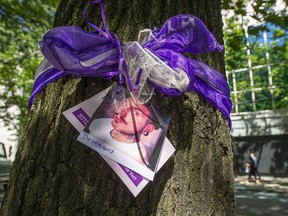In preliminary data from the B.C. Coroners Service, 2,272 people died last year — just 34 fewer than the province's worst death toll in 2021

Deaths from toxic drugs were down — but barely — last year after a record 2,306 lives were lost in 2021, according to a report from the B.C. Coroners Service released Tuesday.
The number of deaths dipped just 34 to 2,272 in 2022 as B.C. continues to “experience tremendous harm and loss as a result of the province’s toxic illicit drug supply,” according to chief coroner Lisa Lapointe.
Start your day with a roundup of B.C.-focused news and opinion delivered straight to your inbox at 7 a.m., Monday to Friday.
Thanks for signing up!
A welcome email is on its way. If you don't see it, please check your junk folder.
The next issue of Sunrise presented by Vancouver Sun will soon be in your inbox.
“Our province continues to lose an average of six lives every day, and many more people experience serious health consequences as a result of the unpredictable, unregulated drug supply,” said Lapointe in a summary of the 2022 data.
“Death due to drug toxicity remains the leading cause of unnatural death in British Columbia, and is second only to cancers in terms of years of life lost.”
The second-largest death toll ever in a calendar year is likely to increase as investigations are finished and final causes of death are determined.
While much focus is put on Vancouver’s Downtown Eastside, the health authority that contains the troubled neighbourhood accounted for only 14 per cent of all lives lost to toxic supply in 2022.

Record high death rates were reported in Northern Health, Interior Health and Island Health last year, which all had above the provincial average of 42.7 deaths per 100,000 residents.
Vancouver, Greater Victoria, Kamloops, Kelowna, Prince George and Nanaimo all recorded more illicit drug-related deaths in 2022 than in any previous year.
Since a public health emergency was declared in April 2016, at least 11,171 deaths have been attributed to illicit drug toxicity in B.C.
The report comes as B.C. decriminalizes small amounts of hard drugs in a move to stem the seemingly unstoppable tide of deadly overdoses.
Starting today, it will not be an arrestable offence to carry up to 2.5 grams of illicit opioids such as heroin and fentanyl as well as crack cocaine, ecstasy and methamphetamines. But advocates for users warn that alone is not likely to do much about the overdose epidemic.
“The reality is that these deaths are preventable,” Lapointe said. “Toxicology data confirms that the drug supply in British Columbia is increasingly volatile and life-threatening.”
Lapointe said health officials and coroners’ death review panels concur the province needs to rapidly increase access to a safer supply while also building a system of evidence-based care.
“Those dying are our family members, neighbours, friends and colleagues. Urgent action is required to reduce the significant risks that tens of thousands of British Columbians are currently facing.”
First Nations continue to be the hardest hit population.
“Given that we are nearing the end of the seventh year of a provincewide state of emergency on illicit toxic drugs, it is difficult to accept that more First Nations people in B.C. have died from illicit toxic drug poisonings than from COVID-19,” said Dr. Nel Wieman, acting chief medical officer for the First Nations Health Authority.
More data from the coroner’s report:
• 70 per cent of those dying were aged 30 to 59, and 79 per cent were men.
• The highest toxic drug death toll was in Vancouver, Surrey and Greater Victoria.
• Fraser Health had the most deaths at 680, followed by 637 in Vancouver Coastal. That’s 58 per cent of all deaths in 2022.
• There was one death reported at an overdose prevention site last year.
Note that the data will likely change as final numbers come in regarding cause of death.
jruttle@postmedia.com
-

Decriminalization alone is not enough, experts warn
-

5 things to know about B.C. decriminalizing possession of drugs for personal use
-

Tracking overdose deaths in B.C.: Who's dying and what's killing them
-

Fraser Health leads as B.C. overdose calls drop slightly
Support our journalism: Our in-depth journalism is possible thanks to the support of our subscribers. For just $3.50 per week, you can get unlimited, ad-lite access to The Vancouver Sun, The Province, National Post and 13 other Canadian news sites. Support us by subscribing today: The Vancouver Sun | The Province.
For more health news and content around diseases, conditions, wellness, healthy living, drugs, treatments and more, head to Healthing.ca – a member of the Postmedia Network.


